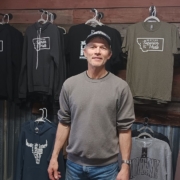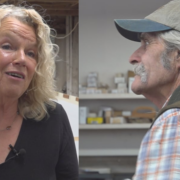When the wind blows in Blanca, the brisk business of sand slides in
Quick links: Regenerative recreation | Property insurance bill passes | Denver’s growing population | Rural Jump-Start additions
BLANCA — On the Sunday before Memorial Day, Amy Raney was helping customers at her rental shop, SpinDrift Sandboards, when a 20-mph wind with 30- to 40-mph gusts pushed a dust storm through Blanca and forced Raney to “batten down the hatches. It was blowing down everything in the universe,” she said.
There went the views of 14,350-foot Blanca Peak. There went the signs pointing to other businesses. But opportunity blew in, too: Blanca straddles U.S. 160 in Costilla County. It’s 20 miles from Alamosa and 25 from Great Sand Dunes National Park. In addition to renting sandboards, Raney rents goggles. And guess what the sandboarders needed?
On Saturday and Sunday, Raney rented out her entire fleet of 115 sandboards two to three times over. And on Sunday, sandboarders rented 52 pairs of goggles to protect their eyes from the gusts. Both are inexpensive — just $20 for a board and $5 for goggles. But Raney made $4,000 — great for a business in a town of 350. And she’s just getting started.
“I’m a serial entrepreneur,” she croaked in an interview, her vocal chords taxed from talking to so many customers over the weekend. That was good, she said, because it meant the shop was busy.
Raney has two businesses in Costilla County: SpinDrift, which opened with 10 boards in 2018, and SLV Property Services, which offers housekeeping services for 15 short-term rentals. And she just completed a business plan for a sandboard she’ll manufacture made out of hemp instead of the usual wood, which will make it “regenerative recreational equipment,” she said.
Regenerative recreation opportunities
She brought her idea to the Wright Collegiate Challenge in 2023, with four students from Colorado Mesa University majoring in outdoor recreation. The annual competition provides students with firsthand experience working alongside businesses and nonprofits as well as civic and governmental organizations to develop actionable solutions to current-day challenges within their respective organizations. Her challenge to them: Create the first hemp sandboard prototype.
Regenerative farmers in the San Luis Valley are growing industrial hemp they turn into fiber that can be used to fabricate goods, she said. “And hemp revitalizes soil, so it’s better for other crops, as well as increasing the amount of pollinators.”
Team Sand Sharks visited FormationAg, an engineering and equipment fabrication company developing solutions for harvesting and processing industrial hemp in Monte Vista. They visited San Luis Valley farms growing hemp. They “did all the research to come up with the recipe for making the boards,” Raney said. And they won the Wright Challenge People’s Choice award.

Raney’s manufacturing facility will sit on part of 10 lots she owns on Highway 160 east of the Blanca post office. She plans to have a no-waste manufacturing process and to harness her energy with solar panels and vertical axis wind generators. She lives off-grid, so she’s versed in using these.
In mid-May, she graduated from a small business accelerator program offered through the Rocky Mountain Microfinance Institute where she worked with a mentor to create a business plan for the boards. She hopes to access a loan through USDA’s Rural Development Grant and Loan Program, which helps small businesses in rural areas get going. And she’s starting to look for other capital, she said.
If all goes according to plan? Watch out, global sandboard industry.
“The goal eventually is to turn all of my competitors in the San Luis Valley into my customers, so everybody’s riding my boards,” she said. “But the first customer will be SpinDrift, of course — replacing all of my inventory with my own boards. And then, who knows? Across the country there are 43 different places to ride sand, and across the world there are hundreds.”
She plans to build retail and rental space, a coffee shop and a yoga studio on the lots with the manufacturing facility.
Blanca business blues and opportunity
But starting a business in Blanca isn’t easy.
“My business is 99% supported by tourists, so that’s how I’m able to make it happen,” Raney said. “But if we don’t do something soon in Blanca, the town will die.”
She’s been a community advocate, she says, for years. Blanca Potato and Blanca Forestry Products are the largest employers in town, and a tiny smattering of other businesses are there, too.
But since 2021, she’s been working with the Town of Blanca’s town council to create more economic opportunities.

The town council and town administrator Reyna Sanchez worked with Downtown Colorado Inc. on the funding and design of a new Festival Park located around a D-500 locomotive originally constructed by George Oringdulph. It was recently purchased by a generous donor and refurbished. Grant funding came from the Colorado Housing and Finance Authority, Colorado Department of Transportation and the United States Department of Agriculture. The train is scheduled to be dedicated today (May 31).
“I was like, ‘Oh, we can do this right,’” Raney said. “We need to if Blanca is going to survive. And I am not about just surviving. I’m about thriving.”
She’s hoping to break ground on the sandboard facility by the end of summer. And in addition to the three people she employs at SpinDrift and the three at SLV Property Services, she’s looking to create four to six more jobs in the coming year.
New law: Insurers must credit homeowner mitigation efforts

Homeowners who have installed metal roofs to protect against hail damage or cleared their property of shrubs to mitigate wildfires did so to invest in their home’s future. But that didn’t mean their property insurance rewarded the efforts.
Now, House Bill 1182, signed into law by Gov. Jared Polis on Thursday, requires insurance companies to do just that, as well as make the process of how rates are determined more transparent and let customers appeal their wildfire risk score, said Michael Conway, Colorado’s insurance commissioner who supported the legislation.
“The bill is an important step in addressing the challenges in our homeowner insurance market,” Conway said in an email. “The bill will help us ensure that Coloradans are getting credit for the mitigation work they perform on their property and in their community. This bill will finally bring needed transparency to wildfire scores for homeowners in Colorado.”
The cost of property insurance has skyrocketed, and insurers have blamed the frequency of disasters and the higher replacement costs. There’s also a growing threat of losing coverage, with nonrenewals picking up in Florida, California and even Colorado.
If homeowners mitigate against risk, those efforts must be considered when calculating insurance rates. Insurers must publish information about available discounts for mitigation every year. The law also requires insurers respond to policyholders who are appealing wildfire risk scores or other inaccurate information within 30 days.
Consumer advocates at the Insurance Fairness Project called it “a good first step,” spokesperson TJ Helmstetter said in a statement. “If it works as intended, this law should help regulators hold the insurers more accountable and protect consumers from industry abuses.”
The law takes effect July 1, 2026.
➔ Earlier: Why disaster mitigation can protect your house, but may not lower your insurance bill — yet
Sun economy stories you may have missed

➔ A fence around a billionaire’s San Luis Valley ranch leads to new state law. Gov. Jared Polis visited Costilla County on Tuesday to sign the law that gives local governments the authority to prohibit disruptive fences. >> Read story
➔ Jared Polis vetoes bill that would have restricted the use of rent-setting software, like RealPage. Rent-setting algorithms have become a target of consumer protection advocates in recent years, which say they effectively enable landlords to collude and drive up the cost of housing. >> Read story
➔ Does Xcel make more than $1B in profit annually? Xcel Energy has 3.8 million electricity customers and 2.2 million natural gas customers in eight states including Colorado. >> Read Fact Check

➔ How life in the oldest county in Colorado is changing. Rural Colorado seniors try to grow old in “God’s waiting place.” But funding for services isn’t keeping up. >> Read story
➔ Colorado’s quantum Tech Hub partners with IBM to train 3,500 workers. It’s part of a federally funded workforce development effort by Elevate Quantum, but this piece won’t cost the organization a dime. >> Read story
➔ Colorado Democrats agree they need to do something about TABOR. But they disagree on what. Eliminate the cap? Use some of the excess to fund specific programs and services? Try to invalidate the 1992 constitutional amendment altogether? >> Read story
You’re invited Join us June 5 for a fun, free event hosted by The Colorado Sun, where we’ll bring together industry experts who specialize in helping young professionals navigate the house-hunting process. >> RSVP
Other working bits
➔ Denver’s population growing faster than most major metros. That’s according to internal data from Bank of America, which found the Denver metro area had the third highest rate of net population growth, at more than 1% in a year as of the first quarter. It was one of 11 major metros with a positive growth rate. Twenty others saw declines.

The bank’s “Homebuyer Insights Report,” also found that while more people may be moving to Denver, that doesn’t mean they’re buying houses. The region saw the fourth largest increase in median mortgage payments overall, “suggesting the hidden costs of homeownership (insurance and property taxes) are rising fastest there,” the report said. >> View BofA report
➔ Durango mental-wellness startup gets grant, tax incentives to add jobs. As the first La Plata County startup accepted into the state’s Rural Jump-Start Program, Durango-based InnerFrame will get some breathing room to focus on job growth. The company, which uses digital media as a mental-wellness tool, received a $15,000 grant Thursday and is eligible for state tax incentives as it works toward a goal to add 20 jobs over the next four years, according to the state’s Office of Economic Development and International Trade. >> Program details
➔ Renter Rights 101 in Colorado Springs. This city-hosted event includes Colorado Legal Services attorney Clinton Albert to explain “lease basics, reasonable accommodations and modifications, deposits, repairs, eviction” and the latest legislation. The two-hour session, held online and in person at East Library in the Pikes Peak Library District, is June 10. >> Details and registration
Got some economic news or business bits Coloradans should know? Tell us: cosun.co/heyww
Thanks for sticking with us for this week’s report. What’s Working is going to try something new this summer with more coverage from monthly contributor Tracy Ross, the Colorado Sun’s rural reporter. As always, share your 2 cents on how the economy is keeping you down or helping you up at cosun.co/heyww. ~ tamara & tracy
Miss a column? Catch up:
What’s Working is a Colorado Sun column about surviving in today’s economy. Email tamara@coloradosun.com with stories, tips or questions. Read the archive, ask a question at cosun.co/heyww and don’t miss the next one by signing up at coloradosun.com/getww.
Support this free newsletter and become a Colorado Sun member: coloradosun.com/join
Corrections & Clarifications
Notice something wrong? The Colorado Sun has an ethical responsibility to fix all factual errors. Request a correction by emailing corrections@coloradosun.com.














Leave a Reply
Want to join the discussion?Feel free to contribute!